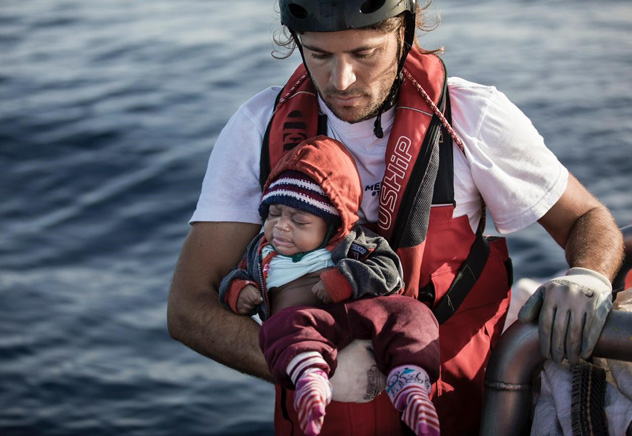
Ημερίδα με θέμα «Μεταναστευτικό και Ψυχική Ανθεκτικότητα» από το Πανεπιστήμιο Frederick

Το Τμήμα Ψυχολογίας και Κοινωνικών Επιστημών και η Μονάδα Ψυχικής Ανθεκτικότητας του Πανεπιστημίου Frederick πραγματοποιούν Ημερίδα με θέμα «Μεταναστευτικό και Ψυχική Ανθεκτικότητα», με κεντρικό ομιλητή τον Ιάσωνα Αποστολόπουλο.
Ο Ιάσωνας Αποστολόπουλος είναι ακτιβιστής υπέρ των ανθρωπίνων δικαιωμάτων και διασώστης στη Μεσόγειο με διεθνή αναγνώριση της ανθρωπιστικής του δράσης στο μεταναστατευτικό.
Η Ημερίδα θα πραγματοποιηθεί στη μεγάλη αμφιθεατρική αίθουσα της νέας πτέρυγας του Πανεπιστημίου Frederick στη Λεμεσό την Τρίτη 31 Οκτωβρίου μεταξύ των ωρών 09:00 -13:00.
Με εισηγήσεις τους θα συμμετέχουν στην Ημερίδα και μέλη του ακαδημαϊκού προσωπικού του Πανεπιστημίου Frederick στη Σχολή Επιστημών Αγωγής και Κοινωνικών Επιστημών. Οι ομιλητές και ομιλήτριες, μέσα από τις εισηγήσεις τους θα αγγίξουν σημαντικά θέματα που άπτονται του μεταναστευτικού όπως είναι η ψυχική ανθεκτικότητα των μεταναστών στην κυπριακή κοινωνία, τα προγράμματα στήριξης μεταναστών σε ψυχολογικό, κοινοτικό και κοινωνικό επίπεδο, ο θετικός αντίκτυπος της πολυπολιτισμικότητας στις σύγχρονες κοινωνίες αλλά και ο ρόλος του σχολείου στην κάλυψη των αναγκών παιδιών με μεταναστευτικές βιογραφίες.
Το Πρόγραμμα
9:00-9:30 Εγγραφές
9 :30-9:45 Χαιρετισμοί
Νατάσσα Φρειδερίκου, Πρόεδρος Συμβουλίου Πανεπιστημίου Frederick
Ρίτα Παναούρα, Καθηγήτρια και Κοσμήτορας Σχολής Επιστημών Αγωγής και Κοινωνικών Επιστημών
Όλγα Κομήτη, Eκπρόσωπος Υπάτης Αρμοστείας για τους πρόσφυγες (UNHCR)
9:45-10:05
Ανθεκτικότητα Μεταναστών: Ψυχικές και Κοινωνικές Προεκτάσεις
Αντρέας Παναγιώτου, Αναπληρωτής Καθηγητής, Τμήμα Ψυχολογίας και Κοινωνικών Επιστημών, Πανεπιστήμιο Frederick
Λουκία Δημητρίου, Καθηγήτρια και Πρόεδρος Τμήματος Ψυχολογίας και Κοινωνικών Επιστημών, Πανεπιστήμιο Frederick
10:05-10:25
Ο θετικός αντίκτυπος των μεταναστών στις σύγχρονες πολυπολιτισμικές κοινωνίες
Σταύρος Πάρλαλης, Αναπληρωτής Καθηγητής, Τμήμα Ψυχολογίας και Κοινωνικών Επιστημών, Πανεπιστήμιο Frederick
10:25-10:45
Παρουσίαση προγραμμάτων Δήμου Λεμεσού για τη στήριξη μεταναστών/τριών
Χριστίνα Τσιαμπαρτά, Κοινωνική Λειτουργός Δήμου Λεμεσού
10:45-11:05
Μπορούμε να βελτιώσουμε τις γλωσσικές και διαπολιτισμικές μεθόδους διδασκαλίας μας, ενσωματώνοντας τις ανάγκες μαθητών/τριών με μεταναστευτικό/προσφυγικό ή άλλο υπόβαθρο;
Δρ Νάνσια Κυριάκου, Λέκτορας, Τμήμα Επιστημών Αγωγής, Συντονίστρια μεταπτυχιακού προγράμματος «Διαπολιτισμικές Σπουδές και η Ελληνική ως 2η/Ξένη Γλώσσα», Πανεπιστήμιο Frederick
11:05-11:35 Διάλειμμα
11:35-13:00
Οι μεταναστευτικές ροές στη Μεσόγειο και ο ρόλος των πολιτικών της ΕΕ
Ιάσωνας Αποστολόπουλος, Ακτιβιστής Διασώστης
Θα ακολουθήσει συζήτηση με το κοινό.
Στους/στις συμμετέχοντες/ουσες θα δοθούν πιστοποιητικά παρακολούθησης. Για εγγραφή στην Ημερίδα, ακολουθήστε τον σύνδεσμο εδώ.
Κατά την Ημερίδα θα παρουσιάζονται στον χώρο έργα που δημιούργησαν παιδιά σε σχολεία της Λευκωσίας υπό την καθοδήγηση της εμψυχώτριας Έλενας Χατζηπέτρου και του εκπαιδευτικού εικαστικού Στέφανου Καράμπαμπα.
Έργα δημιούργησαν οι: Ανδριάννα Σεργίδου - American Academy, Χριστίνα Λυσιώτη - Δημοτικό Αγίου Δημητρίου, Γεώργιος Χαραλαμπίδης - Δημοτικό Β’ Έγκωμης, Λητώ Οικονόμου - Γυμνάσιο Μακεδονίτισσας, Κυριακή Οικονόμου - Γυμνάσιο Μακεδονίτισσας, Ελένη Νεοφύτου - English School, Νικολέττα Χαραλαμπίδη - English School, Εβελίνα Παντζιαρά - Γυμνάσιο Μακεδονίτισσας, Ουρανία Λοϊζίδου - Γυμνάσιο Έγκωμης.
Φωτογραφία: ©Ιάσωνας Αποστολόπουλος
